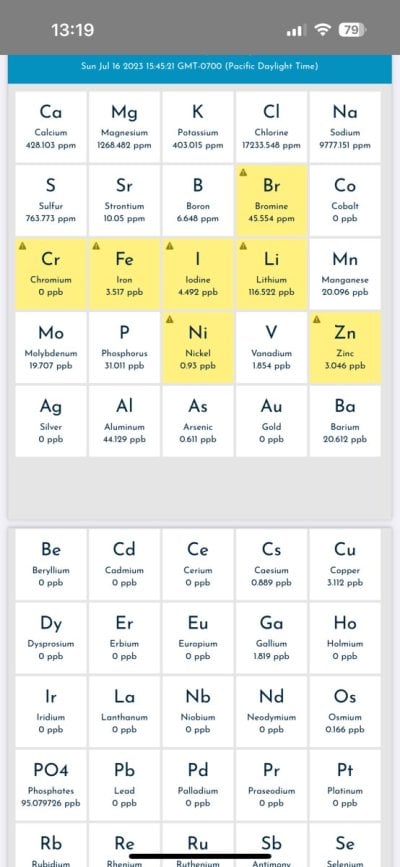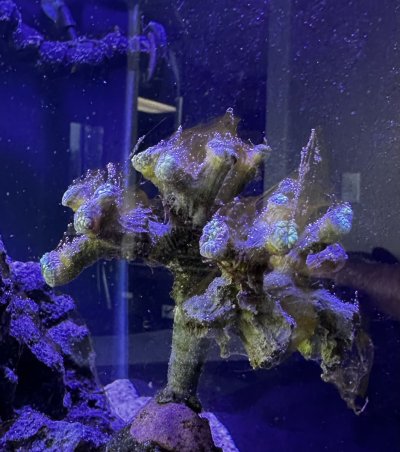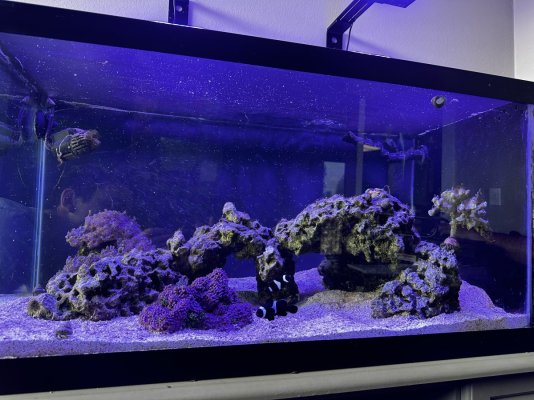Hey Reef2Reef!
Im currently battling with algae and some other things, and I thought I would explain everything here and hopefully receive some much-needed help or thoughts on my tank. I have chosen to over-explain everything to hopefully not miss anything that could be causing me issues, I apologize for the rant...
My current reef system is a 40g breeder, it's roughly 6 years old now and the inhabitants are older. (2 Mated clowns, a goby, and a pistol shrimp) The tank was originally in my room at my parent's house, but when I went away for university it needed to be moved when my parents sold the home. We moved it to my dad's office, and that was roughly a year ago during Christmas. It was a difficult move, but all things considered, I would say it went really well. I also made sure to keep the rock placements the same to eliminate any flow issues. It cleared up after a couple of days and the corals all opened up. Throughout the year, I would travel back and forth doing water changes since I was only an hour away, usually about once a month, but sometimes longer and the tank looked great. I came back about a month later, and I did one of those very basic API standard water tests, and it came back something like:
PH: 8.2
Nitrates: 0
Nitrites: 0
SG: 1.025
My ammonia was a bit high, but I figured this was because of the tank move, and I added a bottle of Tim's bacteria which, opened the corals back up. At this time, my ignorance was telling me that my established tank would be just fine at the current rate and that the parameters were good enough to where I didn't have to worry. During these months when I was gone, I told my dad to feed pellets/brine shrimp, (pellets being his best choice since he's busy) once a week. I know some people say to feed way more than this, like several times a day, but I'm going to be honest, I don't know how that makes any sense, they are the healthiest-looking clowns, and I assume they eat a lot of copepods and other stuff in the tank anyways. After this point, I pretty much let the tank sit until summer when I returned from uni. I don't know if this is what caused my issues, but when I finally finished school my tank was looking horrible, the corals looked angry, and everything was very closed up, (and it's much worse now). I was pretty busy the first bit of summer, but I thought that I would order an ICP analysis kit as soon as possible since I could not figure out what was wrong with my tank. I got the kit, and shipped it in to find these parameters: (I have excluded everything that wasn't acceptable levels, and only included the yellow flagged elements, along with one red element. I also attached an image of my results if anyone wants to see).
Bromine: 45.554ppm
Chromium: 0 ppb
Iron: 3.517 ppb
Iodine: 4.492 ppb
Lithium: 116.522 ppb
Nickel: 0.93 ppb
Zinc: 3.046 ppb
The only red number was Manganese, at 20.096 ppb.
I have never heard of manganese but upon looking at everything in my tank as to what could be causing such high levels, I discovered the fish food (New life spectra) had manganese as its last ingredient. I have no idea if that's what's even causing the high levels, but with how steadily my dad was feeding the tank, I assume that's what caused it. This leads me to my first set of questions being,
How do I remove such a high level of manganese?
- My tank has a built-in filter as it was originally designed for crayfish to not be able to climb out, which consists of biological media and filter floss.) Would carbon help remove this?
How many water changes are needed to fix the tank?
- I have done a bunch of water changes this summer and nothing seems to make the corals happy... I have heard that people get away with using just salt as the additives to their reef, and no dosing, so is this just a hobby lie or do I need to do water changes? Keeping in mind, that my tank used to look great when it was in my room.
Should I be seriously worried about the other parameters?
- For some of the parameters the ICP test flagged, it suggested purchasing certain additives to reduce or increase as needed. Is this something I should do? I don't want to ruin anything else, and buying a different additive for each is going to be expensive.
Along with the coral being closed up and unhappy, my clownfish have been laying eggs, with a new clutch every week or so. I really wanted to raise the babies but with everything else going on it just wasn't feasible. Do the eggs hatching and dying harm the tank in any way, or is it too small of a difference?
As mentioned in the beginning, I have a lot of long stringy algae. It comes off the power heads and grows on the glass. It also protrudes off my frogspawn and sometimes my xenia. Is this harmful to the corals? Picture attached. How do I remove it? More flow or nutrient imbalance?
At one point I'm pretty sure my tank had dinos, and I was too scared to dose dinox. The guy at my LFS instructed me to feed more at the time which pretty much solved the issue, but I don't know if that's related to the dark algae of today.
Lastly, I'm willing to do almost anything to get the tank back in check, I love these clowns as I've pretty much grown up with them and giving them away is something I don't think I can bring myself to do. Would love any assistance with this tank, and if anyone has read this far thanks for listening. Pictures are attached.



Im currently battling with algae and some other things, and I thought I would explain everything here and hopefully receive some much-needed help or thoughts on my tank. I have chosen to over-explain everything to hopefully not miss anything that could be causing me issues, I apologize for the rant...
My current reef system is a 40g breeder, it's roughly 6 years old now and the inhabitants are older. (2 Mated clowns, a goby, and a pistol shrimp) The tank was originally in my room at my parent's house, but when I went away for university it needed to be moved when my parents sold the home. We moved it to my dad's office, and that was roughly a year ago during Christmas. It was a difficult move, but all things considered, I would say it went really well. I also made sure to keep the rock placements the same to eliminate any flow issues. It cleared up after a couple of days and the corals all opened up. Throughout the year, I would travel back and forth doing water changes since I was only an hour away, usually about once a month, but sometimes longer and the tank looked great. I came back about a month later, and I did one of those very basic API standard water tests, and it came back something like:
PH: 8.2
Nitrates: 0
Nitrites: 0
SG: 1.025
My ammonia was a bit high, but I figured this was because of the tank move, and I added a bottle of Tim's bacteria which, opened the corals back up. At this time, my ignorance was telling me that my established tank would be just fine at the current rate and that the parameters were good enough to where I didn't have to worry. During these months when I was gone, I told my dad to feed pellets/brine shrimp, (pellets being his best choice since he's busy) once a week. I know some people say to feed way more than this, like several times a day, but I'm going to be honest, I don't know how that makes any sense, they are the healthiest-looking clowns, and I assume they eat a lot of copepods and other stuff in the tank anyways. After this point, I pretty much let the tank sit until summer when I returned from uni. I don't know if this is what caused my issues, but when I finally finished school my tank was looking horrible, the corals looked angry, and everything was very closed up, (and it's much worse now). I was pretty busy the first bit of summer, but I thought that I would order an ICP analysis kit as soon as possible since I could not figure out what was wrong with my tank. I got the kit, and shipped it in to find these parameters: (I have excluded everything that wasn't acceptable levels, and only included the yellow flagged elements, along with one red element. I also attached an image of my results if anyone wants to see).
Bromine: 45.554ppm
Chromium: 0 ppb
Iron: 3.517 ppb
Iodine: 4.492 ppb
Lithium: 116.522 ppb
Nickel: 0.93 ppb
Zinc: 3.046 ppb
The only red number was Manganese, at 20.096 ppb.
I have never heard of manganese but upon looking at everything in my tank as to what could be causing such high levels, I discovered the fish food (New life spectra) had manganese as its last ingredient. I have no idea if that's what's even causing the high levels, but with how steadily my dad was feeding the tank, I assume that's what caused it. This leads me to my first set of questions being,
How do I remove such a high level of manganese?
- My tank has a built-in filter as it was originally designed for crayfish to not be able to climb out, which consists of biological media and filter floss.) Would carbon help remove this?
How many water changes are needed to fix the tank?
- I have done a bunch of water changes this summer and nothing seems to make the corals happy... I have heard that people get away with using just salt as the additives to their reef, and no dosing, so is this just a hobby lie or do I need to do water changes? Keeping in mind, that my tank used to look great when it was in my room.
Should I be seriously worried about the other parameters?
- For some of the parameters the ICP test flagged, it suggested purchasing certain additives to reduce or increase as needed. Is this something I should do? I don't want to ruin anything else, and buying a different additive for each is going to be expensive.
Along with the coral being closed up and unhappy, my clownfish have been laying eggs, with a new clutch every week or so. I really wanted to raise the babies but with everything else going on it just wasn't feasible. Do the eggs hatching and dying harm the tank in any way, or is it too small of a difference?
As mentioned in the beginning, I have a lot of long stringy algae. It comes off the power heads and grows on the glass. It also protrudes off my frogspawn and sometimes my xenia. Is this harmful to the corals? Picture attached. How do I remove it? More flow or nutrient imbalance?
At one point I'm pretty sure my tank had dinos, and I was too scared to dose dinox. The guy at my LFS instructed me to feed more at the time which pretty much solved the issue, but I don't know if that's related to the dark algae of today.
Lastly, I'm willing to do almost anything to get the tank back in check, I love these clowns as I've pretty much grown up with them and giving them away is something I don't think I can bring myself to do. Would love any assistance with this tank, and if anyone has read this far thanks for listening. Pictures are attached.





















